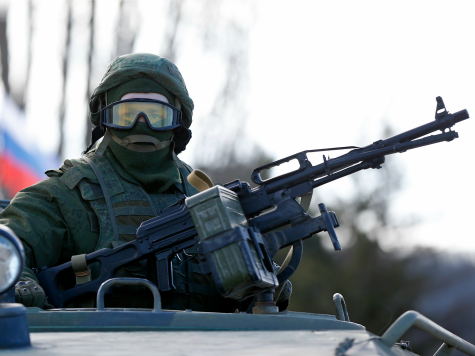
This morning’s key headlines from GenerationalDynamics.com:
- The ‘New Normal’: Russia and China annex other countries’ territories with impunity
- Russia protests Estonia’s treatment of its Russian minority
- Xi Jinping redirects China’s ideology from Marxism to Nationalism
The ‘New Normal’: Russia and China annex other countries’ territories with impunity
With Russia’s annexation of Crimea now a fait accompli, it’swell to remember that this isn’t the first recent annexation of othercountries’ territories. China has already seized islands in the SouthChina Sea that have historically belonged to the Philippines andVietnam and is operating on the belief that any “short, sharp attack”on any one island won’t bring an American response. China intends tocontinue annexing islands in this fashion. (“16-Jan-14 World View — China threatens military seizure of South China Sea island from Philippines”)
The news on Friday is that Russia is massing over 20,000 troops on theborder with eastern Ukraine, evidently with the intention of invading,in order to annex some or all of that territory. It’s really not logicalfor Russia’s president Vladimir Putin to stop with Crimea, since thereare plenty of ethnic Russians in eastern Ukraine–and because Crimeacan’t survive without the fresh water, electricity, gas, and food thatit imports from Ukraine. NBC News
Russia protests Estonia’s treatment of its Russian minority
Russia has long complained about Estonia’s insistence that its largeRussian minority in the country should learn to speak Estonian. Butrecent remarks by Russian diplomats that, for example, Russia wasthat Estonia is one of the countries on Vladimir Putin’s list to beinvaded in order to protect Russian citizens.
Estonia has a centuries-old bitter history with Russia. People todayvividly remember that Josef Stalin’s Red Army reoccupied Estonia inJune 1940 and made it part of the Soviet Union. On a one-nightoperation, June 13-14, 1941, thousands of Estonians, mostly women andchildren, were deported to Siberia, while tens of thousands of menwere forcibly relocated to Russia to fight in the army. This period ofbloody Soviet rule left a deep mark on the Estonians, and so when theGerman Nazis invaded later in 1941, they were greeted asliberators. The Nazis were just as brutal as the Soviets, but when theRed Army returned in September, 1944, some 70,000 Estonians fled thecountry and formed a diaspora throughout Europe and NorthAmerica. After the war, Stalin’s Soviet brutality continued by forcingethnic Russians to relocate to Estonia to dilute the Estonianpopulation. Estonia only became independent in 1991 with the collapseof the Soviet Union.
Today, as Estonia is well into a new generational Crisis era, it ishaunted by ghosts of “Nazi sympathizers” who opposed the Soviets, anda substantial Russian minority, mainly descendants of Russians whomStalin had forced to relocate to Estonia after the war, who considerthemselves to be victims as well.
There are several countries that separate Russia from the EuropeanUnion, and many of them have sizable ethnic Russian minorities whoconsider themselves to be victims. Many of these countries, includingEstonia, are members of Nato, meaning that if Russia invades, thenNato will be required by treaty to fight the invasion militarily.
Russia as a whole, and Putin in particular, are becoming increasinglynationalistic, and it’s possible that Putin will conclude from theexperience of annexing Crimea that Nato won’t respond militarily evenafter a Nato country is invaded but will simply adopt new sanctionssuch as making it illegal for Russian politicians to visit Disneyland.Similarly, the Chinese may conclude from Russia’s experience in Crimeaand their own experiences in the South China Sea that they cancontinue annexing other people’s islands and territories withimpunity. But that would be a mistake on the part of the Russians andChinese. From the point of view of Generational Dynamics, nationalismis going to surge on all sides in this generational Crisis era.
It’s true that there’s a “new normal” today that permits Russia andChina to annex foreign territories with impunity. But actually it’sthe same “old normal” that existed in 1938 when Britain allowed NaziGermany to annex Sudetenland with impunity. As nationalism increaseson all sides, which always happens in a generational Crisis era,sooner or later the “new normal” gives way to military force, and anew war, which has been the “real normal” since time immemorial.International Business Times
Xi Jinping redirects China’s ideology from Marxism to Nationalism
A year after taking office, president Xi Jinping is emerging as thestrongest Chinese leader in decades. He’s adopted Mao Zedong’spopulist style by means of photo ops such as eating steamed buns withordinary citizens.
Xi is also making deep changes to China’s ideological culture to resolve a major ideological conflict. Modern China wasfounded when Mao and his peasant revolutionaries defeated ChiangKai-shek and the Nationalists, in the climax of the CommunistRevolution in 1949. Today, however, the Chinese Communist Party (CCP)elites in Beijing cower in fear at the thought of a new Mao-stylepeasant revolution. So just as Mao’s movement obliterated China’sNationalist past, replacing it with a revolution Marxist culture, Xiis introducing a new orthodoxy which obliterates Mao’s revolutionaryculture in favor of a return to the Nationalist past. This includes anew revival of Confucius and “the excellent elements of traditionalChinese culture.” Naturally, this new direction also builds on thepopular resurgence of interest in traditional culture among manycitizens, amid the sense that Chinese society has lost its moorings inthe midst of rapid economic and social change.
From the point of view of Generational Dynamics, none of this is goingto make any difference. The lives of 3.5 billion Chinese are notgoing to be affected in any way by the adoption by a few Beijingelites of a new ideological culture. These cultural changes alwayscome from the people, anyway, not from the politicians or elites.China had a “peasant revolution” in the 1850s-60s called the “TaipingRebellion,” and had another peasant revolution in the 1930s-40 calledthe “Communist Revolution.” China is now due for a new peasantrebellion, and an ideological diktat won’t change that in any way.Jamestown
Permanent web link to this article
Receive daily World View columns by e-mail

COMMENTS
Please let us know if you're having issues with commenting.